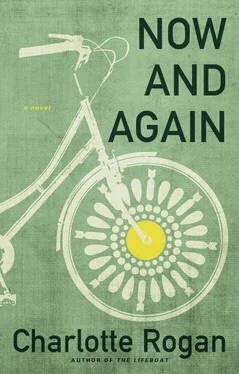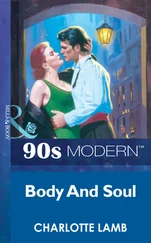Maggie rushed back to Will’s room, only now noticing that nothing of Will remained in it. The emptiness frightened her. Her heart rattled in her rib cage like a broken clapper. The house seemed to be telling her something, so she stood very quietly, listening to the stillness and smelling the musty, closed-up smell. It wasn’t a home any longer, it was only a house.
She crept back along the hallway to the living room. The curtains hung heavily on their rings. Years ago, she had stitched them herself from fabric she had saved up for months to buy. Now she noticed that the hem was coming out and pinprick holes in the floral weave allowed tiny galaxies of light to come through. The once-bright cushions on the corduroy couch were used-up squares of dingy fabric. Dishes with the crusted remains of a meal had been kicked underneath the couch. The desk was piled with unopened mail, and propped up against the desk lamp was a letter from the attorney that started off “Good news!” It went on to say that the appellate court had agreed to a new trial for Tomás, and could she send another installment on the fee? She sat down at the desk to write out a check, but when she flipped through the check register, she saw that Lyle’s paycheck deposits had stopped over a month before.
The desk held other answers: a sternly worded letter from the bank that held their mortgage, a notice of termination from the munitions plant, documentation that Will had passed his army intake physical, had achieved a high score on his vocational aptitude test, was being deployed to Iraq. Maggie gazed out the window, but the oak tree and the rolling landscape were the only things in their proper places. Will had gone off to fight a war she had forgotten all about. How could she have forgotten the very thing that had started her on her current journey? Had she lost her way or found it? Or was life a series of mostly blind turnings guided by instinct and luck? And her husband of almost twenty years, where the heck was he?
She thought of the where-would-you-go game they had played when Will was little. But how was the game relevant? Surely Lyle hadn’t gone to California or Tahiti. And then she wondered if there was something else about the game she should be remembering. The last time the three of them had played it together, Will had only shrugged and said, “I’m too old for that.” But Maggie had played along. It had been before she had found the top-secret document on Winslow’s desk, before they had stopped driving Will to school together, before everything about her life had changed. Before she herself had changed it. She had said, “I’d hop a bus and go clear across the country to New York.”
“A bus,” Will had scoffed. “If you could afford to go anywhere, couldn’t you afford to take a plane?”
“I want to look out the window and see the sights,” Maggie had said, but without Will’s participation, the air had gone out of the game. They had driven the rest of the way to school in silence, but as soon as Will got out, Lyle had patted her shoulder in a consoling way. “I’m with you on seeing the sights, but it might be hard to take a bus to Tahiti. That’s the place I really want to go.”
Maggie had gotten her bus trip after all. She had seen Phoenix and the Grand Canyon, and it was deeply unfair that Lyle hadn’t been with her. But she didn’t think Lyle would go off without her now no matter what had happened. Still, the idea of the bus station stuck in her head. It was a hub of transportation. It was the place, on the day she had departed for Phoenix, she had left the bicycle with a note attached to it that said, PLEASE RETURN TO LYLE RAYBURN WHO LIVES ON OLD OAK ROAD. Now, she hoped someone had returned the bicycle and she would find it in the shed.
The clock in the kitchen said it was 11:40. Something told her she should hurry. Hurry for what? she asked herself, but there was no answer to the question, just an inner ticking and the image of the squat brick building on Hill Street with the bench outside for waiting and the silent morphing of the liquid crystal numbers on the kitchen clock and the familiar weight of the threadbare backpack as she slung it once again over her shoulders and left the house.
12.3 Joe Kelly
Kelly took his coffee outside to watch the street come to life: the white panel laundry truck starting on its rounds, the road crew putting new sewers in the street, the single mother walking her children to the corner and waiting with them for the bus, the muscled brothers who owned the car parts shop rolling up the metal awning and smoking a cigarette, passing it back and forth and calling out to Kelly, “This way only one of us will get cancer.” On the surface, everything was the same as usual, but something tickled Kelly’s attention. For one thing, he wasn’t used to the starched and buttoned cuffs that were poking out from the sleeves of his new jacket, and for another, the captain was gone. For the first time in his life, Kelly felt like the master of his own fate, but he also felt a little disconnected and alone.
He walked across the tracks toward the school bus stop where the oldest child was telling the younger ones horror stories of what awaited them in third grade. “What are you going to school on Saturday for?” he asked.
“Make-up days,” said the oldest. “Because of all the snow.”
“Da-amn,” said Kelly. “Well, come and see me when you’re out.”
“You boys are on your own this evening,” said the single mother. “I started that new job, but I’ll see you tomorrow for sure.”
“Things are looking up,” said Kelly.
“Yes, I think they are.”
The bus rolled to a stop. Shiny faces peered down at Kelly through the glass. The driver said, “Hurry up, kids.” The single mother blew three kisses, and together she and Kelly watched the bus chug up the street toward the intersection.
When it was out of sight, she said, “Me oh my, you look good in a suit! What’s the special occasion?”
“Big meeting today,” said Kelly. He would have liked to linger in the cool morning air and enjoy the sense of change and possibility, but he had work to do. The buyers and their lawyers were coming at noon to deliver a draft of the sales contract and to answer any questions the men or the attorney they had hired might have. When Kelly had asked to make it a condition of the sale that the site wouldn’t be shut down and that the new owners would keep Le Roy and Danny on if they wanted to stay, the representative for the buyers had said, “No problem, man. Why would my clients pay a million dollars for something only to turn around and shut it down? They believe in this mission is why, and they have the money to do it right. They’re hoping you’ll all stick around for a while.”
The sewer crew started up their jackhammer, splintering the morning quiet as Kelly walked back down the street. Above him, the clouds exploded with brightness and the air was sharp with the smell of new-mown grass. With the captain gone, there was no one to question his decisions, but no one to help him make them either. It was both liberating and disconcerting.
He drained the last of his coffee and headed back inside. Le Roy had gone on his morning run, but Danny was standing in the middle of the room adding his voice to the din from the jackhammer:
The rich get richer and the poor stay poor
While we’re knock knock knockin’ on the devil’s door.
The Defense Department isn’t keeping score,
And the generals talk about esprit de corps
As they sign you up for another tour
So the rich can get richer while the poor stay poor.
Sinclair’s absence made the decision to sell the website easier, but now Kelly wondered if it was the right thing to do. He was beginning to feel at home in the warehouse. They had applied for an occupancy waiver, and the sense of being somewhat settled astonished him. Besides, now that the captain was no longer around as a force of opposition, Kelly had started to see the mission of the website from the captain’s point of view. He had started to wonder if making a profit off the sale was ethical and if he should divide the site into two separate entities — one for the everyday horror stories and one for hard-core revelations like those contained in the classified documents they had already published and the ones Le Roy said they were getting from a new source at the NSA.
Читать дальше












